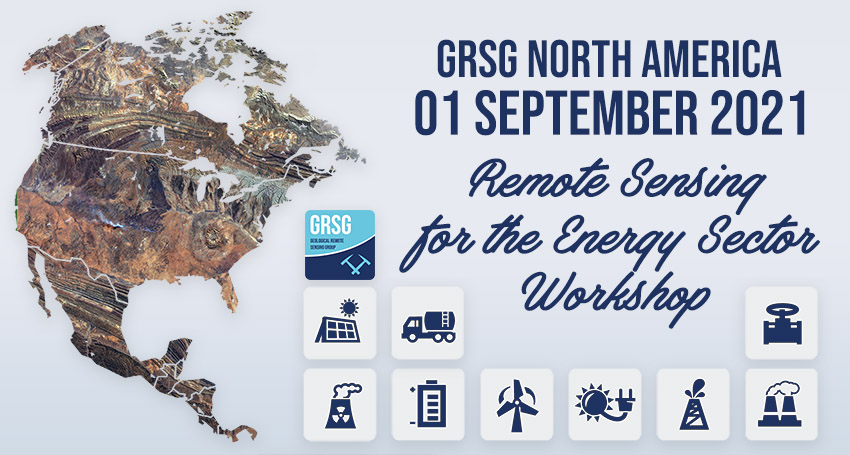Remote Sensing for the Energy Sector Workshop
GRSG North America: September 01 2021
 The increasing demand for energy and natural resources on a finite planet must be balanced by their sustainable discovery, extraction, and production.
The increasing demand for energy and natural resources on a finite planet must be balanced by their sustainable discovery, extraction, and production.
Remote sensing and associated geospatial technologies support this objective by providing crucial information to decision-makers at every stage of energy and resource projects.
This first Virtual Geological Remote Sensing Group (GRSG) North America Energy Workshop aims to provide sessions detailing use-cases, applications, and technologies covering the full range of applications of remote sensing within energy industries.
The workshop will encompass sessions involving the mature, operational applications of remote sensing across the energy sector, as well as sessions detailing beneficial cutting-edge technologies, workflows, and use-cases.
Event Agenda
| Time | Speaker | Presentation |
|---|---|---|
| 7:00 - 7:10 | Christian Haselwimmer | Opening Remarks |
| 7:10 - 7:25 | Juan Peña, Orbital EOS | Oil spill remote sensing: a step beyond using AI and multisource satellite data |
| 7:25 - 7:40 | Chandra Taposeea-Fisher, CGI | Oil and Gas Industry Earth Observation Response Portal (OGEO – ReP) |
| 7:40 - 7:55 | Awais Ahmed, Pixxel | The Hyperspectral Advantage in Oil & Gas |
| 7:55 - 8:10 | Alex Gow, Satellite Vu | How the SatelliteVu constellation will transform monitoring of energy assets |
| 8:10 - 8:25 | Q & A | |
| 8:25 - 8:40 | Martijn Houtepen, Sky Geo | Predictive maintenance of underground gas networks using satellite remote sensing InSAR data |
| 8:40 - 8:55 | Parwant Ghuman, 3vG | Satellite-Based Early Warning System for Oil and Gas Infrastructure |
| 8:55 - 9:10 | Scott Stokes, University of Colorado | Numerical Investigation of the Relationship Between Pore Pressure Perturbation and Early-Stage Seismicity: A Case Study of the Raton Basins Induced Seismicity |
| 9:10 - 9:25 | Q & A | |
| 9:25 - 9:35 | Break | |
| 9:40 - 9:55 | Raquel Serrano-Calvo, TU Delft | Analysis of COVID-19 impact in NO2 and CH4 emissions with TROPOMI satellite observations in the Permian Basin (U.S.) |
| 9:55 - 10:10 | Jean-Francois Gauthier, GHGSat | Monitoring Methane Emissions From Oil and Gas Facilities With The Same Sensor on Airborne and Satellite Plaforms |
| 10:10 - 10:25 | Riley Duren, University of Arizona | Carbon Mapper: global tracking of methane and CO2 point-sources |
| 10:25 - 10:40 | Q & A | |
| 10:40 - 10:55 | Break | |
| 10:55 - 11:10 | Benoit Rivard, University of Alberta | Plants and Robotics to strengthen fine tailings: contribution of remote sensing for monitoring revegetation |
| 11:10 - 11:25 | Lori Shelton Pieniazek, Spectral Evolution | Using UV-VIS-NIR portable spectrometers to identify contaminants in soil |
| 11:25 - 11:40 | Ninad Bhagwat, Montana Tech | Run-of-River Hydroelectricity Generation (Hydro-gen) Modelling Driven by Remotely Sensed Hydrological Data |
| 11:40 - 11:55 | Q&A | |
| 11:55 - 12:00 | Closing Remarks |

